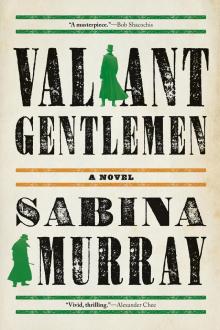- Home
- Sabina Murray
Valiant Gentlemen Page 2
Valiant Gentlemen Read online
Page 2
“I might,” he replies in Kikongo, “if you can tell me where Mayala Mbemba is.”
“By the river looking at the Dutch trader’s women.”
Casement gives the child a piece of hardtack, which was in his pocket when he put on his trousers this morning. When did he put it there? The child seems happy and Casement is satisfied because he knows, from experience, that the child’s information is correct.
There is Ward standing on the riverbank watching the spectacle of De Groot’s harem—four women, their glossy skin set off by yards of embroidered snow-white muslin, arrange themselves into a canoe amid a musical chatter.
Casement sees his shadow standing next to Ward’s, but is still.
“I know you’re there, Casement,” says Ward. “And I can feel your disapproval.”
“Of the Dutch trader?”
“Of me.”
“Four is a lot of women,” says Casement.
“One would be enough.”
“It’s easily arranged.”
“And a lot of money. It wouldn’t be worth it with the work we’re doing.”
“Not unless she could walk forty miles in one day.”
“Very funny,” says Ward. He turns from the spectacle of the women with some effort.
“Did you get the bullocks?” Casement asks.
“It has been decided that we should have no bullocks,” a little humor here, “as they are highly susceptible to the tse-tse. So instead it has been proposed that the enormity of the shaft,” more humor, “be offset with a significant number of porters.”
“Porters?”
Ward nods.
“I would recommend at least a hundred men,” says Casement. “One hundred, no fewer.”
“Which is what I recommended and that number is on their way up from Vivi.”
“How?”
“The Arab Tippo Tib is supplying the porters.”
“Tippo Tib is a slave trader,” says Casement. “Are we now in business with him?”
“Someone is,” replies Ward.
There’s a moment where both Casement and Ward contemplate their insignificance. We are pawns, they think together. We are powerless. Then the moment passes, carried off by a doctoring wind.
“Did you get the Madeira?” asks Ward.
Casement nods. It would seem they are provisioned.
II
The Florida
March 1887
Today there might be rain. Ward looks upriver, at the sandbars rising like the vertebrae of some giant creature. Navigation on these stretches will always be dicey. A group of four birds flies speedily up the river and Ward follows them with his hands grasped around an imaginary rifle, as if he’s setting up a shot. Mbatchi disturbs his reverie by pulling on his pants leg.
“What?” says Ward. “Does someone need me?”
Mbatchi nods.
The messenger speaks Kikongo, although he’s Kibabatu, from upriver. He tells Ward about a village just over the ridge that has food to trade—sorghum for the porters, maybe some goat stew for him and Casement—which is good news because two years ago and not far from their present location a French missionary was taken out by a spear, although the flinger of the spear was never seen: as if the jungle herself had flung it unaided by human hands. According to this messenger, there is no need for concern: All here is peaceful. Perhaps there will be something of interest for Ward to sketch. He shows the messenger a few pages from his sketchbook and the messenger is very impressed and smiles warmly. The next village has beautiful women, says the messenger. Ward explains that his art is not confined to what is beautiful. The messenger says that that is good because the men of this village (a head shake here) are very ugly. Ward gets the joke and laughs very loud—too loud, because he is so pleased with himself for understanding humor in Kikongo. He and the messenger laugh together. Next, Ward asks about elephants.
After Ward has arranged a meal for the messenger, he goes to look for Casement, who is redistributing the contents of one of the baskets as the man who was carrying it has gone lame. Casement is looking at the man’s foot where a thorn has become imbedded. The foot is inflamed.
“Shoes would solve some of this,” says Casement.
“We would need a lot of porters to bring shoes to this many porters.”
“And those porters would also need shoes.” Casement smiles. He tells the man, one of the Loango, that he is welcome to go home now. He will be paid for his labor and should take care with his foot so that it heals now rather than becomes more infected.
“We’re not supposed to give partial payments,” says Ward. “The job is the whole portage, not just two weeks.”
“It’s only a few brass rods,” says Casement.
“I’m not arguing with you,” says Ward. “But we’re about to have a rash of people stepping on thorns. And I think we’re up to ten people who have run off. The porters are supposed to be chained.”
“And then when one falls, we risk injuring the entire column.”
“Which is why we’re doing it your way. But I’m not sure if it’s the right way.”
Casement pretends to consider. He shrugs. He looks up at Ward. “I heard there was a messenger.”
“From Stanley Pool.”
“What did he say?”
“He said there was a lone bull elephant maybe four miles from here. He didn’t get a good look at the tusks, but surely resting the men for a couple of hours would be good for all.”
“And surely they didn’t send a messenger from Stanley Pool to tell you that.”
“No,” says Ward. “Troup wanted to know if we have the brass wire for the boiler assembly.”
“I’m not sure,” says Casement.
“I already checked and the wire’s missing. It was supposed to arrive at Stanley Pool with a bunch of Manyema porters supplied by Tippo Tib,” says Ward. “Tippo Tib insists that it’s either on its way, or has arrived and been misplaced, or that maybe the Manyema porters got mixed in with ours.”
“I think we would have noticed that.”
“That’s what I said.”
“Anything else?”
“There’s a village less than a half day’s march from here.” Ward shifts his weight. “Can I go after that elephant?”
Casement thinks. “If you bag it, that’s meat for the men, and they could use something better than manioc. What if you go with Mbatchi and eight men to carry the meat in case you’re lucky, and I’ll pitch camp in another five or so miles, which should bring us closer to the village, and you can meet us there.”
“You could wait for me here.”
“Mayala Mbemba,” says Casement, “what’s another five miles to you—you, who walked forty miles in one day?”
They finally find the elephant after trekking close to six miles. One of Ward’s men, Mboko, an exceptionally tall fellow at six feet four, sights it at good range. Ward, who is on the short side, something that served him well when he was an acrobat in Sydney, can barely see over the top of the long grass. But he’s good at balancing.
What he would really like to say is: Mboko, would you mind terribly if I got up on your shoulders? Instead, he says: “Mboko, I sit on back.” And mimes shooting with his rifle.
Mboko nods in response. Ward clambers onto Mboko’s back and then onto his shoulders and another man hands him back his rifle. There’s the elephant feeding, stripping the bark from a young tree. The elephant is flapping its ears, swinging its tail peacefully. Mboko, aware of the shifting breeze, moves to right and left, anxious to stay downwind. A lone bull elephant is very dangerous and even if all seems quiet—bucolic—Ward knows that if the elephant picks up their scent, it will attack. He nudges Mboko with his heel and Mboko edges forward through the grass.
Ward has a straight shot to the back of the beast’s head. N
ot the most exciting way to kill an elephant, he thinks. If he gets this shot, he won’t be charged, and the brute will most likely die instantly. If he gets this shot, he won’t have to track the elephant through the jungle for a day and a night—he’s done that before—and there won’t be much of a story. If he gets this shot, he’ll walk over to see what sort of tusks there are, rather than seeing the tusks come at him. And he’s witnessed people who have been gored by elephants, although he’s never actually seen someone in the process of being gored.
He feels Mboko tense up beneath him. They’re close now and Mboko is wondering why he doesn’t take the shot. And then the rifle is raised. Ward holds steady and sights, finger exerting an even pressure on the trigger, squeezing calmly. BLAM. A perfect hit to the back of the head. The elephant shudders. Reload. BLAM. And the elephant falls. After one more shot for certain death, they cut the thing up and cart what can be carted back to camp.
Casement is fiddling with some verse. Yes, fiddling. He looks at the lines:
The barren hills of Ulster held a race proscribed and banned
Who from their lofty refuge viewed their own so fertile land
It’s a bit stiff, but the meter’s right. He thinks of Ward’s drawings, all Africans, and his poems, all Irish history. Is this what makes them different, that Ward constructs himself out of his own personal history, while Casement’s personality demands a further reach? Why write about post-Plantation Ulster in the Congo? Well, the Bakongos are somewhat displaced as they shuttle around carrying things for the English. And he is somewhat displaced, first as one who is Irish when he’s not being British, British when he’s not being Irish, and sometimes both simultaneously. He checks his watch. It is closing in on eight, although time means little here—only daylight and darkness. He hears a swell of expectant chatter. Ward must be back.
Sure enough, there’s Ward bearing his usual cheerful expression as if he’s just walked into a parlor for a Saturday chitchat, or bumped into Casement on the way to a cricket match. The porters’ baskets are full of meat.
“What’s for dinner?” says Ward.
“Looks like elephant,” Casement replies.
“I’m not eating elephant,” says Ward.
“It tastes just like hippo, and I know you eat that.”
“It does not taste like hippo, well, not much. And I only eat hippo if it’s very young.” Ward sits on a crate by Casement’s chair. “What have you got there?”
“Poem.”
“Any good?”
“Not yet.”
Ward flips open his sketchbook and finds the picture. “What do you think?”
“It’s an elephant.”
“That all?”
“It’s dead.”
“The perspective was very difficult. Look at the legs.”
“That is some accomplished foreshortening. Why’d you do it?”
“They were going to chop it up. It seemed a shame not to preserve it.”
“Then why’d you kill it?”
The tent has been erected, prepped for eating rather than sleeping, with the walls rolled up and buckled in place. There are chairs and a table and a cloth on the table and the Madeira is there, half full, a reminder that sometimes these young men are rewarded. A moth enters from the right side of the tent, inspiring a bat the size of a cat to dispose of it midway.
“Stanley’s book, Through the Dark Continent, have you read it?” Ward asks.
“Yes. Hasn’t everyone?”
“It’s full of bravado,” says Ward.
“I think that’s the typical writing style of short, ill-tempered men.”
“So you were not taken in by Stanley?”
“I think I was,” says Casement, and he tops up his glass, “which has contributed to my assessment of his writing style.”
Ward fixes Casement with an appallingly earnest look. “Casement, all we do is walk. First we walk tens of miles finding porters, then we march them back to Matadi or Vivi or Boma or wherever. Let’s say we do this in the pouring rain. Then we put things in baskets and the porters put the baskets on their heads, and then we walk some more. The rain clears up and it gets really hot. And then. Well. More walking.”
“What does this have to do with Stanley?”
“What made his experience spectacular and adventurous when ours seems so boring?”
Casement considers. “He was the first. He got shot at. He ran out of food.”
“We run out of food,” says Ward.
“And isn’t it exciting when that happens?”
“You’re making fun of me.” The insects crawling on the lamp are casting fantastic shadows on the inside of the tent.
“Yes.”
In the porters’ camp, some have started singing. More join in, the chorus of porters rising and falling as if carried back and forth by a fickle current.
“God,” says Ward, “you would think they could sing something better.”
“Are you homesick, Ward?” The porters’ singing grows louder and now there’s a drum in with it. Casement smiles. “Do you think we could teach them ‘Greensleeves’?”
Ward slams his glass down, tops it up, and drinks. “I hate England,” Ward responds, “and England hates me. But that doesn’t mean that I like the Congo Free State.”
“‘Alas, my love,’” starts Casement, “‘you do me wrong,’” his voice catching with the distant porters’, “‘to cast me off, discourteously.’” This is not a military drum. “‘For I have loved you—’” This is a heart beating.
“‘—well and long!’” sings Ward, who voices like a drunken publican even when sober.
And together, “‘delighting in your company.’”
After “Greensleeves” they sing “Jerusalem.” And after that, some interminably long Irish thing to which Casement knows all the words and now, after hearing the chorus once, Ward knows it, and he too wants the young lovers to “come to the bower,” although he has no idea what exactly that means, or ever meant.
The day enters with its usual blanket of heat. Casement might welcome rain, but that would transform the path into a river, which would, in turn, give way to a mud track. And the brief relief from the insect population that happens in the wake of these torrential downpours would only offer up the intense humidity that mosquitoes love so well. One discomfort is merely exchanged for another, which makes the absence of choice about such things almost tolerable. Or at least promotes a philosophical stance regarding his lack of control.
Ward is dissatisfied and restless. Before he agreed to this latest venture, Ward had been about to leave Africa for England and return home—even if he denied having one. He was ready to find a career for himself, although he seemed more focused on finding a woman. Ward is only involved in the transport of the Florida because the pay is very good. Ward is now making twenty pounds per year more than he himself is, but he can’t begrudge Ward anything. For his company alone, Casement would have paid the difference in their salaries. It is Ward who punctuates his days: Ward in the morning by the edge of the water in his breeches; Ward’s signature high-noon squint; Ward’s rangy walk as he patrols the length of the column, his constant interrogation of messengers and locals about the possibility of game; and late-afternoon Ward with his sketchbook, wandering in search of something to draw. Casement envies the basic appeal of drawing—one’s vision is, if nothing else, oversubscribed—whereas he, with his poems, is often faced with the blankness of his own mind that he struggles to populate with long-dead Irish kings.
Casement sees Ward chatting with one of the cook’s assistants. The corners of Ward’s mouth are pulled back in displeasure, while the hands of the cook’s assistant, fingers splayed and heels of palms supporting invisible riches, describe some gustatory delight.
Ward catches Casement staring and—for one long second—holds his gaze.<
br />
“Bush rat,” he shouts.
“Bush rat?”
“On the menu,” says Ward, coming over. “What did you think I meant?”
“I wasn’t thinking,” says Casement. “It isn’t rewarded, so why bother?”
Ward is flipping through his sketchbook. “What?” he says. This particular “what” means that Ward has missed what’s been said.
“Anything interesting today?” asks Casement.
“Just some Manyanga,” says Ward. He flips through his book, brushing bugs off as he goes, bugs that become pressed and preserved like the flowers pressed and preserved by women at home. There are sketches of plants, a porter with radiating facial scarring, a still life of gourds and pipes.
“Stop,” says Casement.
Together they look at a woman, full-lipped, erect carriage, hair shaved close to the head. “You like her?”
“Not the woman. The necklace.” It’s endearing, Ward’s ability to chronicle everything without actually seeing it. “Her necklace, Ward. Look at it.”
“It’s quite unusual.” The necklace is formed in a fine coil about the woman’s neck, like a loose spring.
“It’s wire.”
“Probably.”
“It’s brass wire.”
“Oh,” says Ward. “That’s right. The missing brass wire for the boiler assembly.”
Certainly this is funny, but the effort required to gather up the brass wire—or what is still collectable—will be significant. He’ll send out some men tonight, before the women and their wire disappear. Of course this was all predictable. Tippo Tib is corrupt as they come and if only the supervisors would acknowledge that there is a difference between a dissembling Arab slaver and, for example, an honest Bakongo chief, such mistakes would be rare. As it is, the Belgians, the English, the French would all rather do business with the Arabs because of their smattering of European language and their inclination to wear clothing.
“Here,” says Ward, pushing the sketchbook into Casement’s arms, “take a look. Maybe you’ll find something else.”
“Where are you going?” asks Casement.

 Tales of the New World: Stories
Tales of the New World: Stories Forgery
Forgery The Caprices
The Caprices A Carnivore's Inquiry
A Carnivore's Inquiry Valiant Gentlemen
Valiant Gentlemen